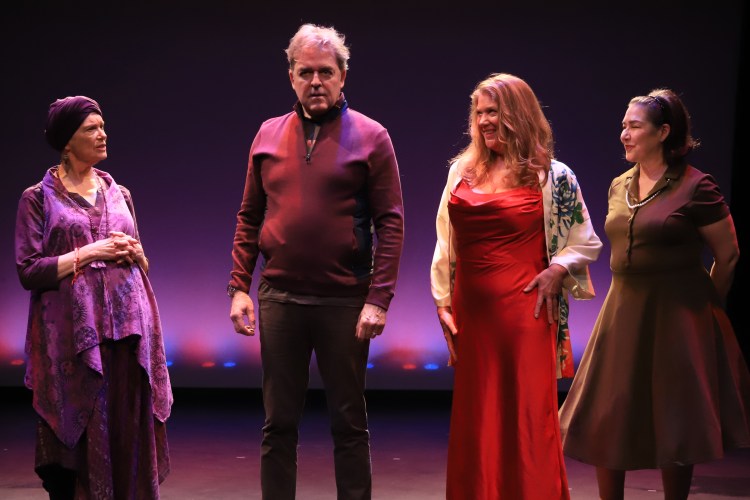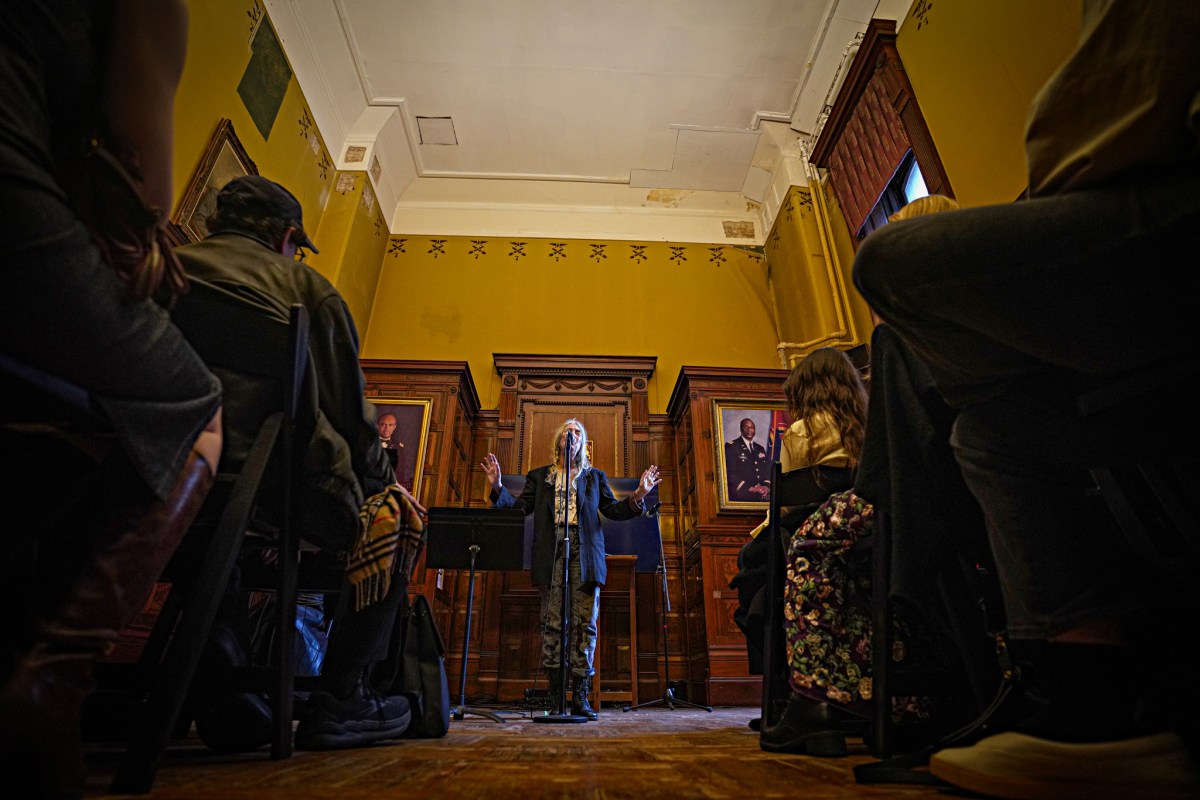Snowlion Repertory Co. presents “Faust in the Anthropocene” at The Hill Arts through Sunday. Pictured from left are Kim Gordon (Mara), James Noel Hoban (Faust), Kathleen Nation (Raga), and Carole Florman (Arati).
Photo by Tom Bloom Faust is a legendary figure in theater and literature. Perhaps the most famous version of his story is a two-part tragedy by the German writer Johann Goethe in the early 1800s. The protagonist is highly successful but constantly dissatisfied with his life.

He makes a deal with the devil, trading his soul for knowledge and power. Al D’Andrea is the artistic director at Snowlion Repertory Co. and the latest playwright to reimagine this story.
“Faust in the Anthropocene” weaves the legend with themes of Buddhism and the modern climate crisis, and it is on stage now through Sunday. The play has a cast of 14 actors who play 60 different roles. D’Andrea, who is directing the show, answered five questions about this work as he prepared for opening night.
This interview has been edited for clarity and length. The mission at Snowlion is really to develop and present new works. Why is that something that’s important to you? It is particularly important to us at Snowlion Rep to create new work and newly imagined work.
And “Faust in the Anthropocene” is a newly imagined piece. It’s a contemporary version of the Faust legend. It’s particularly important to us because our goal is to really reflect the world as it exists at the moment in time that we are presenting a play.
Quite often, the existing canon of plays provides works that do that, but oftentimes, a new play specifically aimed at holding up the mirror to nature in the present moment is, in our view, needed. “Faust in the Anthropocene” includes original music written by Aaron Robinson. Pictured are Joshua Flanagan (Paris), Jason Iannone (Meneleus), Devin Domeyer (Helen), Jesse Reich (Hector), and Isis Phoenix (Hecuba).
Photo by Tom Bloom What is the Anthropocene? The definition is the current geological age viewed as a period during which human activity has been the dominant influence on climate and the environment. That was very important to me, exploring the toll that wealth, power, money, influence, takes on the environment. Is there a way that we can have a more compassionate embrace of the earth? How do the wisdom tales from Buddhism inform the story? In Buddhism, grasping and desire are very strong elements of what creates unhappiness for us.
I saw that parallel to Goethe, to Faust. Grasping, desire, inability to be satisfied. I’ve been wanting for many years to do a play about the wisdom tales from the East, but didn’t have a strong dramatic context to present it on the stage.
But it just came to me that I could interweave these two paths of existence — the path of Faust, dissatisfied, wanting more and more and more, never happy, constantly yearning, and another path that leads to more acceptance of life, acceptance of being and connecting with our intrinsic joy. Playwright Al D’Andrea was inspired by tales from Buddhism as he reimagined the Faust legend. Pictured here are Harlan Baker (Buddha), Tristan Rolfe (Seeker) and the company.
Photo by Tom Bloom You’re deliberately staging this play in advance of Earth Day, and climate change is a major theme. Can you talk a little more about how the play grapples with these themes in the environment? The various scenes are set in different seasons of the year, and they reflect the kind of environmental crises that are occurring now in our age. Unusual rains, heavy rains and flooding.
Early springs. Hot, torrid summers. Various extreme weather events just frame the various scenes of the play as we go through it.
Also, Faust is opposed by a character named Zee, who represents Generation Z and is an eco-activist. Zee has a group of eco-activists who are protesting against the powerful who are pillaging the Earth. A Greta Thunberg kind of character.
We see Zee’s search to help the Earth and to discover who she is. You talked about developing new works that “hold up a mirror” to the present moment. Why did you feel like the legend of Faust could really be used as a vehicle to do that in the modern day? You look at the world today and the stratification between the haves and the have-nots is so extreme now.
There’s so many billionaires, so many people of extreme wealth. But the vast majority of people are struggling. We have this character who is given whatever he wants, and he wants more and more and more and more, while everybody else languishes more and more and more.
You can imagine some of the references I thought of as I was writing this. I hope the play will ultimately instill in the audience the idea that there is hope, and that we can find our way through this current morass we’re in. We just have to be strong and keep going forward, searching.
There is an answer out there. We have to believe that we can save our Earth and take action to do that. Rachel Schuster as Zee in “Faust in the Anthropocene” by Snowlion Repertory Co.
Photo by Tom Bloom IF YOU GO WHAT: “Faust in the Anthropocene” by Snowlion Repertory Co. WHERE: The Hill Arts, 76 Congress St., Portland WHEN: Through Sunday HOW MUCH: $27 in advance or $32 at the door INFO: For more information, visit snowlionrep.
org or call 207-315-6612. We believe it’s important to offer commenting on certain stories as a benefit to our readers. At its best, our comments sections can be a productive platform for readers to engage with our journalism, offer thoughts on coverage and issues, and drive conversation in a respectful, solutions-based way.
It’s a form of open discourse that can be useful to our community, public officials, journalists and others. Read more..
. We do not enable comments on everything — exceptions include most crime stories, and coverage involving personal tragedy or sensitive issues that invite personal attacks instead of thoughtful discussion. For those stories that we do enable discussion, our system may hold up comments pending the approval of a moderator for several reasons, including possible violation of our guidelines.
As the Maine Trust’s digital team reviews these comments, we ask for patience. Comments are managed by our staff during regular business hours Monday through Friday and limited hours on Saturday and Sunday. Comments held for moderation outside of those hours may take longer to approve.
By joining the conversation, you are agreeing to our commenting policy and terms of use . More information is found on our FAQs . You can modify your screen name here .
Show less Please sign into your Press Herald account to participate in conversations below. If you do not have an account, you can register or subscribe . Questions? Please see our FAQs .
Your commenting screen name has been updated. Send questions/comments to the editors..
Entertainment

Faust meets a climate activist in a new play

Snowlion Repertory Co. is presenting the work this week and next at The Hill Arts.















